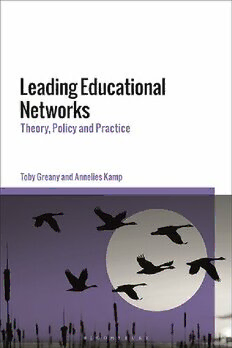
Leading Educational Networks: Theory, Policy and Practice PDF
265 Pages·2022·1.604 MB·English
Most books are stored in the elastic cloud where traffic is expensive. For this reason, we have a limit on daily download.
Preview Leading Educational Networks: Theory, Policy and Practice
Description:
This book offers a global perspective on educational networks, reviewing theory and practice before setting out four lenses: educational effectiveness and improvement; governance theory; complexity theory; and Actor-Network Theory. Using these lenses, Greany and Kamp explore the limits and possibilities for collaboration by analysing case studies of networks in Aotearoa New Zealand and England as well as country-level overviews of networks in Chile and Singapore. The four lenses allow the authors to explore the implications of networks from different perspectives: moving from the level of the individual school, to the local and national systems that schools operate within, to the wider environmental factors that shape, and are shaped by, network activity in education. The authors examine why and how networks have become a feature of education systems worldwide and the implications for policy, practice and research. They consider how networks form, develop, reform, and achieve impact, but also why they can be challenging and often fail to achieve their ambitions. The book concludes by drawing out the implications for leaders and the further development of leadership at different levels of education systems, and by identifying further avenues for research.
See more
The list of books you might like
Most books are stored in the elastic cloud where traffic is expensive. For this reason, we have a limit on daily download.
